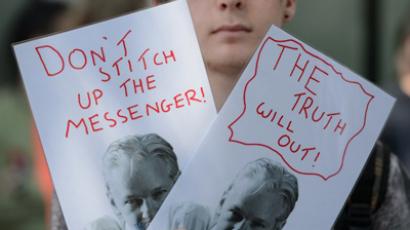'US escalating intimidation of whistleblowers’
By neglecting whistleblower protection laws and escalating the Manning and Assange cases, the US government is setting a precedent to be applied to journalists, future whistleblowers, activists and bloggers, activist Sibel Edmonds told RT.
Edmonds is the founder of the National Security Whistleblowers coalition, an independent alliance. The activist believes Bradley Manning and Julian Assange are just the beginning.RT: Is Bradley Manning a hero or a criminal in your view?Sibel Edmonds: Bradley Manning is a hero, no doubt about it. And you have to look back at the bigger picture here, because the intention here is not only to make an example out of Bradley Manning by punishing him, and this is without any due process, basically ignoring all his rights both as a US citizen and a military officer. They have not followed the process that is supposed to be at work here under government whistleblower protection laws. Looking beyond just setting an example by punishment, this is also to set precedents, and this is what the American public and, actually, people around the world need to understand because by setting precedents, they are showing that they are not going to stop with Bradley Manning or Julian Assange. So then you are looking at an escalation with each case, whether it is Bradley Manning or Julian Assange or the recent whistleblowers who have faced indictment. What they are doing is, they are waiting to see what kind of reaction they are going to get from the public, and this is not only the US government, but also other governments. And with Assange the case is going to be very interesting because what is going to be established here is unprecedented. His precedent will apply to journalists, to other whistleblowers, to activists and to media, to any kind of bloggers. RT: Do you think Assange will be extradited to Sweden?SE: This is what it looks like, and unfortunately, it is not only limited to the US government because you should also look at this as a rule of reciprocity. In the future you are going to see one government asking another government to extradite someone who is a political activist, someone who may even be a political refugee. And again, it is very ironic, as on the one hand, you have the US State Department with Hillary Clinton pointing the finger at China and saying "how dare you punish dissidents and jail them," and the other that’s exactly what we are doing, and not only here nationally, but on a global scale. RT: Do you think the recent cases of guests from the Julian Assange Show being interrogated by the FBI might deter potential whistleblowers from coming forward with their stories?SE: Absolutely. It already has. My organization during the Bush administration gathered more than 150 national security whistleblowers from the Pentagon, the CIA, the FBI, the Department of Homeland Security. In the past two or three years, that number has fallen down to one or two whistleblowers. I still get reports from government insiders, but they are saying that what they are seeing with the Obama administration is that all these cases are not going to come forward, and they are also seeking ways to make the information they have available because they believe that the American people have a right to know this information. This is not classifying some really necessary intelligence gathering methods. We are looking at classifying the government's criminal activities, government fraud, government waste, government abuse, and so yes, they have been deterred. The intimidation tactic by the FBI is not new. This was happening even in the early 2000s under the Bush administration with other government whistleblowers. It is happening in my case, when the FBI visited people who were going to come forward to Congress and be witnesses to my case; these were senior FBI agents. So they are escalating these intimidation tactics.














